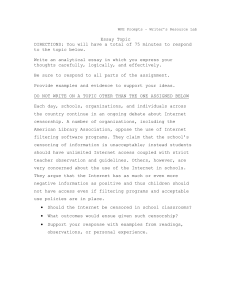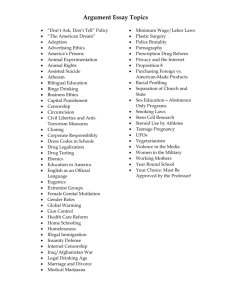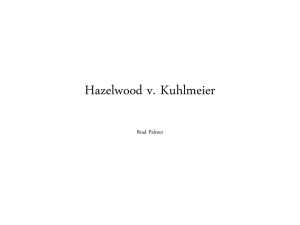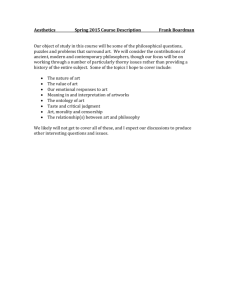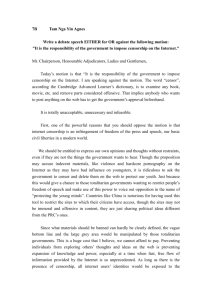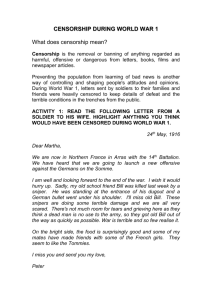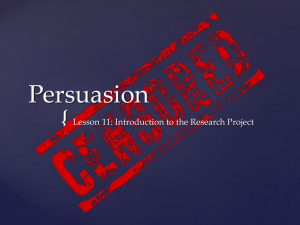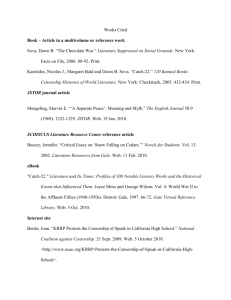What we need for slides
advertisement
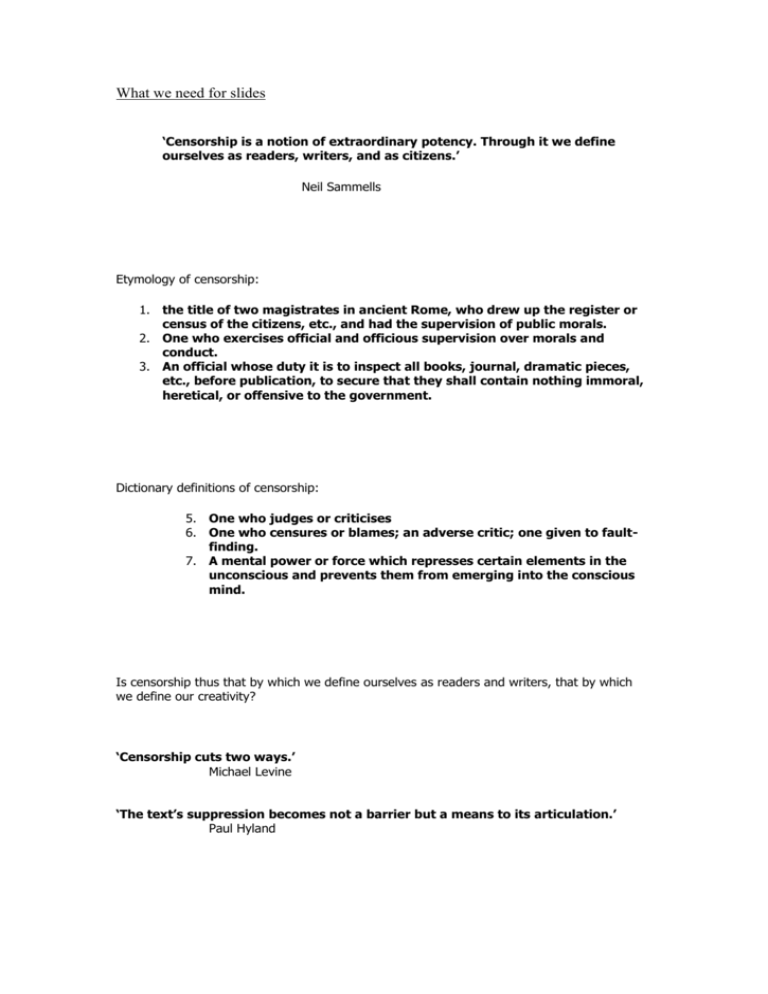
What we need for slides ‘Censorship is a notion of extraordinary potency. Through it we define ourselves as readers, writers, and as citizens.’ Neil Sammells Etymology of censorship: 1. the title of two magistrates in ancient Rome, who drew up the register or census of the citizens, etc., and had the supervision of public morals. 2. One who exercises official and officious supervision over morals and conduct. 3. An official whose duty it is to inspect all books, journal, dramatic pieces, etc., before publication, to secure that they shall contain nothing immoral, heretical, or offensive to the government. Dictionary definitions of censorship: 5. One who judges or criticises 6. One who censures or blames; an adverse critic; one given to faultfinding. 7. A mental power or force which represses certain elements in the unconscious and prevents them from emerging into the conscious mind. Is censorship thus that by which we define ourselves as readers and writers, that by which we define our creativity? ‘Censorship cuts two ways.’ Michael Levine ‘The text’s suppression becomes not a barrier but a means to its articulation.’ Paul Hyland ‘writing is unthinkable without repression.’ Jacques Derrida (Freud and the Scene of Writing) ‘Authorship and censorship interact to induce creative plenitude.’ Nigel Smith ‘the question of censorship itself seems immortal, it is only the answers which change.’ Donald Thomas ‘It would be nice to think that there was a simple, rational logic to censoring which we could happily endorse or else completely reject without further analysis, but it is more likely that there isn’t or isn’t always so.’ Richard Brown Id like to sip those richlooking green and yellow expensive drinks those stagedoor johnnies drink with the opera hats I tasted once with my finger dipped out of that American that that had the squirrel talking stamps with father he had all he could do to keep himself from falling asleep after the last time we took the port and potted meat it had a fine salty taste yes because I felt lovely and tired myself and fell asleep as sound as a top the next moment I popped straight into bed till that thunder woke me up as if the world was coming to an end be merciful to us I thought the heavens were were coming down about us to punish when I when I blessed myself and said a Hail Mary like those awful thunderbolts in Gibraltar From the final book of Ulysses Following Whitman quote to go on handouts, but not on powerpoint (unless we have time to read it) Published copy Once I pass'd through a populous city imprinting my brain for future use with its shows, architecture, customs, tradition, Yet now of all that city I remember only a woman I casually met there who detained me for love of me, Day by day and night by night we were together — all else has long been forgotten by me, I remember I saw only that woman who passionately clung to me, Again we wander, we love, we separate again, Again she holds me by the hand, I must not go, I see her close beside me with silent lips sad and tremulous. (Once I Pass'd Through A Populous City) Original manuscript copy Once I pass'd through a populous city imprinting my brain for future use with its shows, architecture, customs, tradition, Yet now of all that city I remember only a man I casualy met there who detained me for love of me, Day by day and night by night we were together — all else has long been forgotten by me, I remember I saw only that man who passionately clung to me, Again we wander, we love, we separate again, Again he holds me by the hand, I must not go, I see him close beside me with silent lips sad and tremulous. (Once I Pass'd Through A Populous City) “the author has seen in advance which passages might give rise to objections from the censorship and has on that account toned them down in advance, modified them slightly, or has contented himself with approximations and allusions to what would genuinely have come from his pen. In that case there are no blank places in the paper, but circumlocutions and obscurities of expression appearing at certain points will enable you to guess where regard has been paid to censorship in advance.’ Sigmund Freud ‘Writers often achieve a power of concentration which political liberty, or literary anarchy, would have allowed them to escape, when they are constrained by the tyranny of a monarch or of a poetic, by the strictness of prosodic rules or of the official religion.’ Marcel Proust ‘What is deadly is not freedom, but the violation of freedom.’ Zamyatin ‘The [story] becomes a “figure” for an extreme existential situation: the choice between loyalty and betrayal, personal conscience and political expediency, courage and moral cowardice, good and evil.’ L. Milne ‘To murder the thinker does not murder the thought.’ Arnold Wesker


